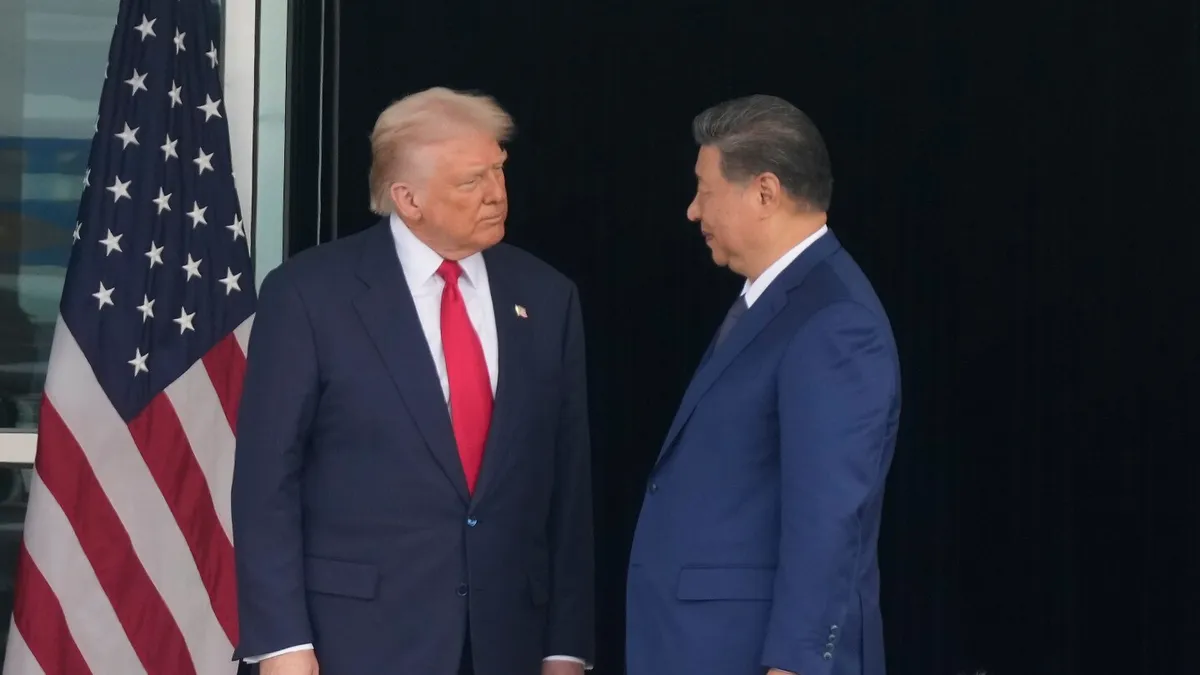
BANGKOK (AP) — U.S. President Donald Trump characterized his recent meeting with China's top leader, Xi Jinping, as "amazing," highlighting that it resulted in significant decisions. The initial official comments from China were less definitive, indicating that a comprehensive trade deal is still a work in progress. The two leaders met on the sidelines of the Pacific Rim summit in South Korea, where they agreed to scale back some trade measures and collaborate on resolving ongoing issues.
The one hour and 40 minute meeting did not delve into long-standing issues such as the tensions surrounding Taiwan, a self-governed island claimed by China. However, Trump reported that China had committed to purchasing substantial quantities of American farm products and ensuring a steady supply of rare earth elements, which are essential in various industries.
During the flight home on Air Force One, Trump informed reporters that he had agreed to reduce his 20% tariff increase, originally imposed due to China’s role in producing harmful substances like fentanyl, to 10%. In response, China confirmed that it would lower the average tariffs on U.S. goods from 57% to 47%. Both nations have agreed to continue efforts to combat the illicit flow of drugs into the United States.
While some tariff increases remain in effect, both countries have temporarily paused further hikes that had been set to take place since May, allowing time to work on a strategy to address ongoing trade tensions.
Trump also discussed the sales of computer chips to China, noting that both his administration and former President Joe Biden had previously imposed restrictions on access to advanced chips, particularly those used for artificial intelligence. He mentioned that China is set to engage with Silicon Valley chipmaker Nvidia to purchase various computer chips, although this will not include the next-generation Blackwell AI chip.
According to Trump, the Chinese government has pledged to buy a "tremendous amount" of U.S. agricultural products, including soybeans and sorghum. While the details were not explicitly provided by the Chinese side, U.S. Treasury Secretary Scott Bessent later clarified that China agreed to purchase 25 million metric tons of U.S. soybeans annually. The initial phase will see China buy 12 million metric tons of soybeans from the U.S. between now and January.
This commitment comes after a period during which Beijing reduced its imports of U.S. agricultural products, significantly impacting American farmers. Trump encouraged farmers to invest in their operations, stating, "Farmers should immediately go out and buy more land and larger tractors," expressing gratitude towards Xi for the agreement.
Regarding the popular video-sharing platform TikTok, China expressed its willingness to collaborate with the Trump administration to resolve ownership disputes, although no specific progress has been announced. Meanwhile, Trump indicated that China had agreed not to impose tighter restrictions on the export of rare earths and associated technologies, alleviating concerns about access to these critical minerals used in various industries, including electric vehicles.
Trump also mentioned that both nations would refrain from imposing higher port fees on each other's vessels. He added that China is set to begin purchasing oil and gas from Alaska, and discussions are ongoing to solidify this energy deal.
Following the meeting, Xi highlighted that the negotiating teams from both countries had reached a consensus, referencing discussions held in Malaysia. He emphasized the need for prompt follow-up actions to yield tangible results that would reassure both nations and the global community.
Xi pointed out that the evolving relationship between the U.S. and China offers valuable lessons, advocating for positive interactions on the global stage. He stressed the importance of cooperation over confrontation, identifying several areas where both countries could collaborate, including combating illegal immigration, telecom fraud, and tackling infectious diseases.
In conclusion, the meeting between Trump and Xi marks a significant step in U.S.-China relations, with both leaders aiming to navigate through complex trade issues and foster a cooperative approach to global challenges.